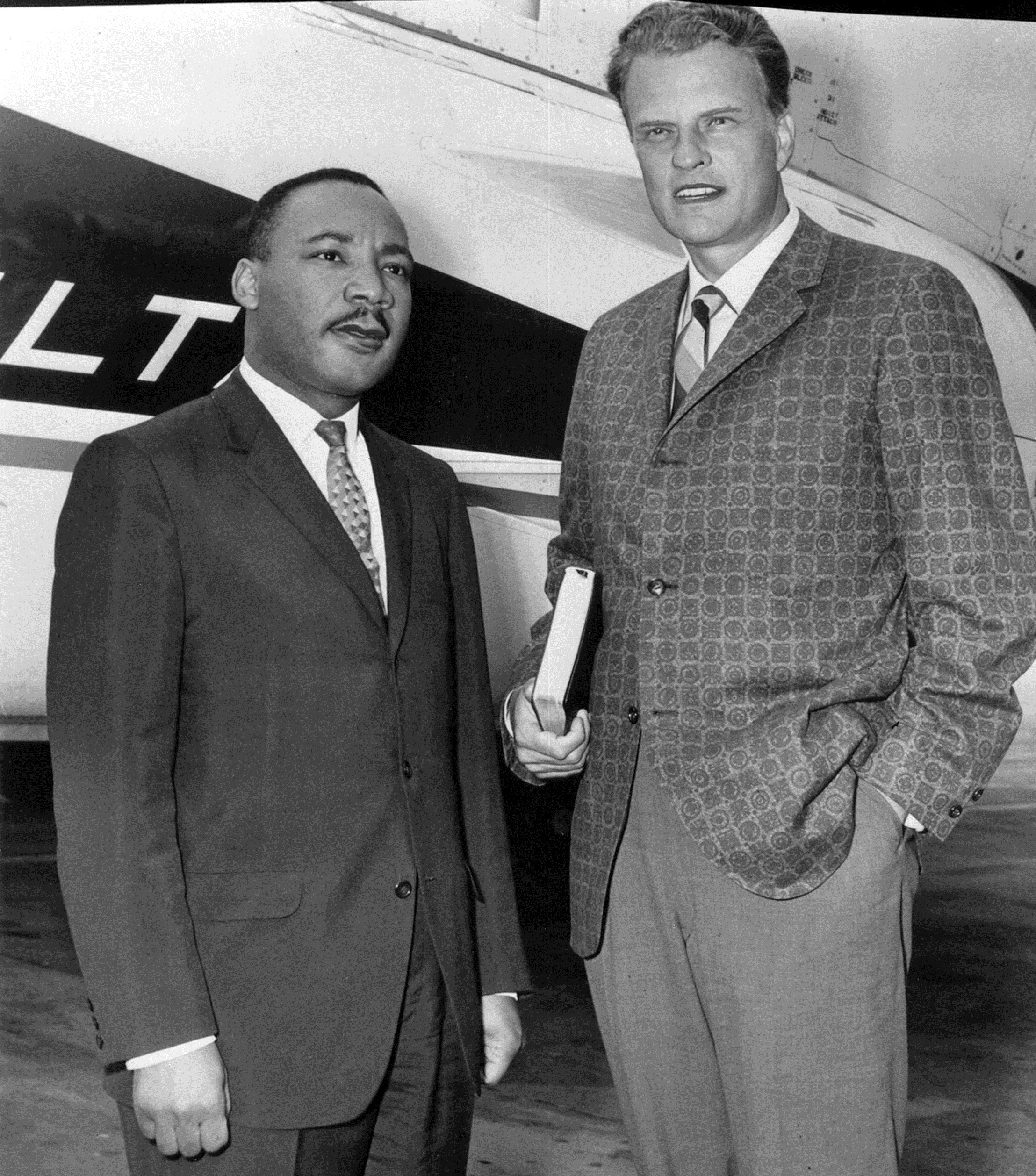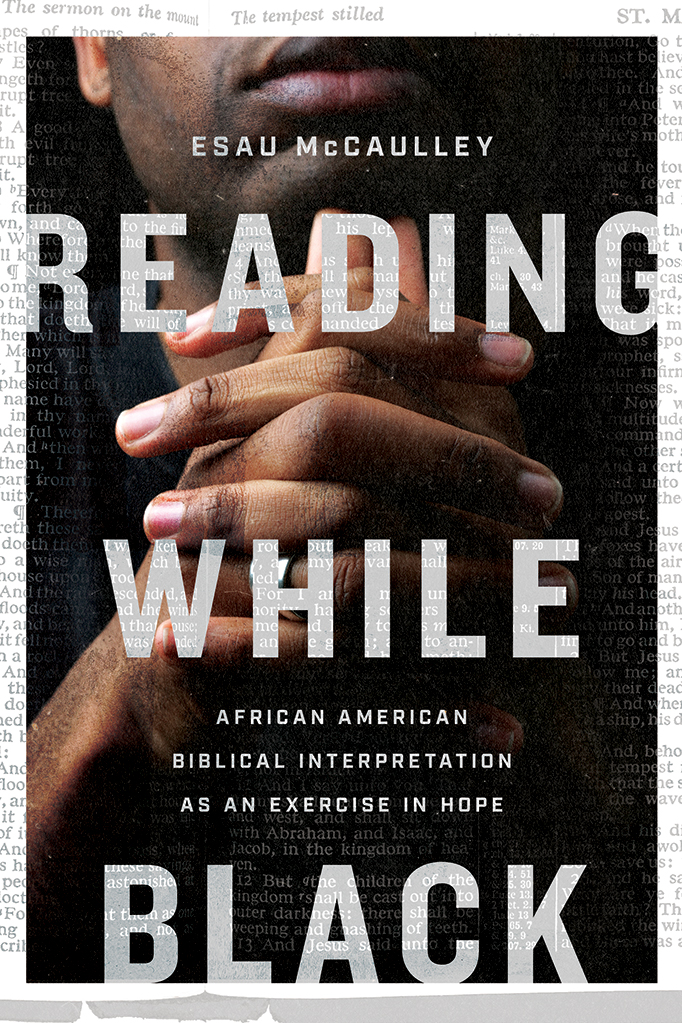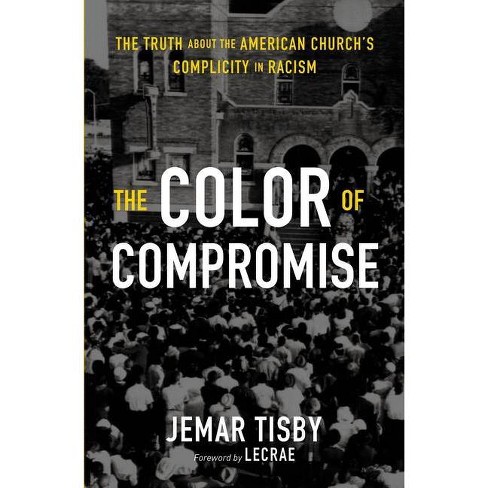White evangelicals are less likely than any other religious or demographic group in the United States today to believe that Blacks experience structural racial discrimination. But is this blind spot a result of their theology or merely their cultural heritage or some other factor?
 (BGEA)
(BGEA)
This was the question that I wish Anthea Butler had addressed more directly in her book White Evangelical Racism: The Politics of Morality in America. While Butler’s book correctly notes some of the many examples of white evangelical racism over the past two and a half centuries, it did not, in my view, offer a convincing explanation for why white evangelicals have adopted their particular views of race. But the answer to that question should matter to anyone who wants to find a solution to this problem. If racism is rooted in our theology, then those of us who are evangelicals need to renounce that part of our theological tradition – and maybe even renounce evangelical theology itself, if the theology is irredeemable. If, on the other hand, our racism is the result of a failure to live up to our theological tradition, then the solution is not to be less theologically evangelical, but rather to be more consistent practitioners of the principles that evangelicals believe.
Not surprisingly, historians who identify as evangelical (such as Tommy Kidd) have tended to see white evangelical racism as separate from the tradition’s theology, while historians who do not currently identify as evangelical (such as Butler) have been much more likely to see a close connection between racism and something intrinsic to evangelicalism itself, such as evangelicals’ most deeply held beliefs about God and the world. In general, I side with Kidd rather than Butler. But both groups face an interpretive challenge, I believe.
If we view white evangelicalism racism as an intrinsic part of white evangelical theology, we have to then explain why Black Protestantism experienced a very different trajectory on race even while embracing all of the theological tenets of David Bebbington’s quadrilateral, which the National Association of Evangelicals has adopted as a descriptor of evangelical beliefs. And we have to explain why several significant steps toward racial egalitarianism in America – the beginning of the abolitionist movement in New England and the creation of the first interracial college, for instance – were the work of white evangelicals.
But if we go so far as to say that white evangelical racism has no connection to white evangelical theology, we have to explain why the millions of people who are the most likely to support Donald Trump and the most likely to oppose Black Lives Matter and Critical Race Theory just happen to be white evangelicals. That seems to be more than an aberration.
Whatever theory of white evangelical racism that we accept has to explain all facets of the movement. We have to explain the antislavery views of William Wilberforce and John Wesley, as well as the pro-slavery position of George Whitefield and later James Henley Thornwell. We have to explain both why Billy Graham did not support Martin Luther King Jr.’s nonviolent civil disobedience, but also why the African American advocate of civil rights John Perkins nevertheless decided to work closely with white evangelicals. What we need, in other words, is a nuanced history of white evangelical theological and cultural views of race that will explain all of the complicating factors in this story – as well as offer a hopeful guide for white evangelicals who are wondering what the next chapter should be. Jemar Tisby’s The Color of Compromise does some of this very well, and I won’t repeat all of his helpful insights here. But I do want to make a few additional points that I think are often lost in the debate.
In my opinion, both racial egalitarianism and racial blindness in evangelicalism are produced in part by the same theological tenet: belief in an individual’s direct access to God through individual conversion in a born-again experience, followed by a lifelong ongoing indwelling of the Holy Spirit, leading to a transformed life. (For a historical explanation of why this has been a distinguishing feature of evangelicalism, I highly recommend Kidd’s Who Is an Evangelical?). Earlier generations of English Protestants had believed in the necessity of being regenerated through the Holy Spirit, but they had not placed such strong emphasis on a single moment of conversion, nor was their theology as individualistic or anticlerical as that of the eighteenth-century evangelicals was. The new emphasis on direct individual access to the Holy Spirit appealed to many African Americans, who discovered Christianity primarily through its late eighteenth-century evangelical Methodist and Baptist forms. In theory, the doctrine had the propensity to level all social distinctions and allow self-emancipated people without any formal education, such as Harriet Tubman, to directly communicate with the Spirit’s voice. Indeed, many African Americans wanted to take this direct access to the Holy Spirit even further than most whites did, which is one of the main reasons why Blacks played a central role in creating Pentecostalism in the United States and why Pentecostalism during its first decade was the most racially integrated religious movement in America at the time.
But if a focus on the Spirit’s role in individual conversion had the propensity to be racially egalitarian, it also produced, in many white believers, an overconfidence in the power of individual spiritual conversion to solve social problems and a complete rejection of the idea of structural sin. The theological view that sin is structural and rooted in institutions just as much as in individuals was part of the late nineteenth-century Social Gospel, and when it was introduced in American Protestantism, it met a hostile reception from evangelicalism’s conservative wing. When fundamentalists separated from more liberal Protestants in the early twentieth century, nearly all of the people who believed in the Social Gospel joined the liberal wing of American Protestantism, which meant that when the modern evangelical movement reconstituted itself as an offshoot or rebranding of fundamentalism in the mid-twentieth century, it didn’t have many Social Gospel advocates in the midst. That is not to say that mid-twentieth century evangelicals were not concerned about social problems. They were – as Carl Henry explained in The Uneasy Conscience of Fundamentalism. But their proposed remedies tended not to go much beyond regulation of individual behavior, nor did they challenge the fundamental structure of the American economic system and racial order. Without a firm theology of structural sin, they were not prepared for the civil rights movement of the late 1950s and 1960s.
White evangelicals’ strong anticommunism and corresponding deep respect for the state in the early years of the Cold War led them to uniformly reject the nonviolent civil disobedience of Martin Luther King Jr. while citing Romans 13 and their concerns about Communism as their reason for doing so. And although the mainstream white evangelicalism associated with Christianity Today made racial egalitarianism (at least in its “color-blind” conservative form) a priority in the 1970s, it was usually a lower priority than other political causes that led evangelicals into the conservative camp – causes such as protecting the family, fighting the sexual revolution and second-wave feminism, and eventually, opposing secular humanism and abortion. In all of these cases, white evangelicals were very comfortable using the power of the state to fight individual sin – the only sin that they recognized, and therefore, the only sin that they thought they could oppose through politics. The individual sin of racism, they believed, had already been adequately addressed through legislation (such as the abolition of slavery in the 19th century) or, in the case of all contemporary racism – which they identified solely with individual racial hatred – was beyond the power of legislation to correct. Racial justice was therefore not a political issue, in their view, and it did not have to affect their voting choices.
A significant minority faction in white evangelicalism is now newly open to the idea that fighting structural racial injustice is an urgent political priority that Christians need to embrace. This is an important theological move for a tradition that has long been intensely individualistic. If the pages of Christianity Today magazine, the writings of Tim Keller, and the actions of Wheaton College (which, after thoughtful reflection, recently removed a plaque containing the word “savages” as part of a memorial to Jim Elliot and other missionaries) are any guide, it appears that a number of influential white evangelicals now believe that fighting racism means opposing racist structures as well as individual racial hatred. In other words, they now know that mere color-blindness does not equate to anti-racism.
However, their actions have been complicated by the outsized presence within evangelicalism of what, for lack of a better term, I will call white southern civil religion. Evangelicalism did not originate in Appalachia or the South, but when white southerners (especially those in Appalachia) discovered it in the late eighteenth and early nineteenth centuries, they found its individualism and anticlerical egalitarianism a perfect fit for their values. And over time – first, after the Civil War, when the Lost Cause became part of southern civil religion, and then in the twentieth century, when militarism and Christian nationalism were added to the mix as well – white southern civil religion became inseparably linked with the messages preached from the pulpit in some of the white evangelical churches in the region. But white southern civil religion is not the same as evangelicalism in its classic or historic form, even if the two are sometimes confused.
Whereas classic evangelical theology calls people to repentance, white southern civil religion encourages a proud, militant triumphalism. Classic evangelical theology is about the cross – which, in Christian tradition, is a call to die to oneself in following Jesus. White southern civil religion is about the gun – a militant assertion of the right to wield a weapon in self-defense (a weapon which, perhaps not coincidentally, has often been denied to African Americans). The creed of white southern civil religion is aptly expressed on the back of a T-shirt that I observed a white woman wearing at our local fireworks celebration in Carrollton, Georgia, last Sunday night: “Faith, family, freedom, flag, firearms – Things you don’t mess with.”

If by “evangelicalism” one means the anxious-bench centered preaching of John Wesley or Charles G. Finney, it’s hard to argue that the “faith” of the gun-toting militant patriotism expressed on that T-shirt is evangelical. Nor is it remotely close to the faith of contemporary Anabaptist-leaning evangelicals such as Ron Sider and Greg Boyd who have denounced the Christian nationalism that is inseparably linked to white southern civil religion. But perhaps it’s pretty close to the faith that Mike Stone and many of his supporters in the Conservative Baptist Network hoped that the Southern Baptist Convention would embrace last month.
On the issue of race, contemporary white southern civil religion is deeply committed to the principle that structural racism does not exist in modern America, and that racially integrated churches and the power of the gospel is all that is required to usher in the color-blind society that they think is the only antidote to racism that is currently needed. And unfortunately, on this particular point, white southern civil religion is able to draw on a classic evangelical theological blind spot in a tradition that has traditionally seen sin only in individual terms – a blind spot that devotees of white southern civil religion have now distorted into an article of faith, as the attempt of the Conservative Baptist Network to get the Southern Baptist Convention to condemn Critical Race Theory demonstrated.
So, what does this mean for the future of evangelicalism and race? How should white evangelicals deal with the complicated theological legacy of their movement when it comes to race?
Those of us who are white evangelicals who are concerned about the presence of racial injustice in contemporary America have to be honest about the mixed legacy of our tradition on race. Evangelicalism in the United States contributed to racially progressive movements in cases in which the egalitarian implications of an individualistically oriented theology of sin and salvation could be easily applied to issues of racial injustice. Billy Graham’s decision to racially integrate his crusades was one of those moments. So was Jonathan Edwards Jr.’s decision to become an abolitionist nearly two centuries earlier. But conservative evangelicalism’s rejection of the Social Gospel at the end of the nineteenth century left it without the tools necessary to respond adequately to the issue of civil rights in the 1950s and 1960s, and as a result, white evangelicalism has largely been working without an adequate theological toolkit for decades.
What is necessary at this point is not to deny evangelicalism’s historic (and, in my view, theologically correct) insistence on the importance of individual conversion but rather to supplement this theology with an admission that a strictly individualistic view of sin and salvation missed the larger biblical picture. Sin is corporate and structural as well as individual, and the sooner that white evangelicals recognize this, the better. But I think that there is a way to embrace this idea without losing our evangelical theological commitments. Indeed, I think that evangelical theologies of the fall and original sin, combined with holistic views of the effect of Christ’s work on all creation, provide the basis for distinctively evangelical responses to structural sin, even while preserving evangelicalism’s historic emphasis on the radical and thoroughly egalitarian idea of individual conversion through the direct work of the Holy Spirit.

We do not have to leave our theological tradition behind to join Black Christians in calling for national repentance from the sins of deeply embedded structural racism. Esau McCaulley’s Reading While Black makes a convincing argument that Black Protestant ways of interpreting the biblical text on issues of race and social justice are actually more theologically orthodox – indeed, more faithful to evangelicalism’s tenet of biblicism – than are white evangelicals’ historic readings. A number of prominent white evangelicals – including southern whites such as Russell Moore as well as northerners like Tim Keller – have embraced many of these ideas and have repudiated the assumptions that form the basis of the white southern civil religion that is too often confused with the evangelical theological tradition.
It’s important to keep voices like Moore and Keller’s in mind when reading polls on white evangelicals’ beliefs about race, because what I think we’re seeing in those polls is a reflection of the fact that American evangelicalism today is overwhelmingly both geographically and culturally southern today, and in the minds of the majority of its white adherents, it has become entangled in a form of civil religion that is a Christian heresy. But the large presence of white southern civil religion in American evangelicalism should not blind us to the truth that there is another brand of evangelicalism on offer. Yes, the Conservative Baptist Network’s opposition to Critical Race Theory is part of contemporary American evangelicalism. But so are all of the evangelicals who have made Jemar Tisby’s books a part of their reading groups and are taking some of his suggestions to heart. So are the white evangelical churches that are finding ways to repent of racial injustice and embrace a new concern about structural racism.
So, is white evangelical racism an intrinsic part of evangelical theology? There’s a deeper theological reason for it than I, as a white evangelical, would like to admit. But even if it’s deeply rooted, it’s not an intrinsic part of evangelicalism. The good news for evangelicals is that if evangelical theology contributed to white evangelical blindness on racial issues, it also contains the remedy to help us see clearly again.














